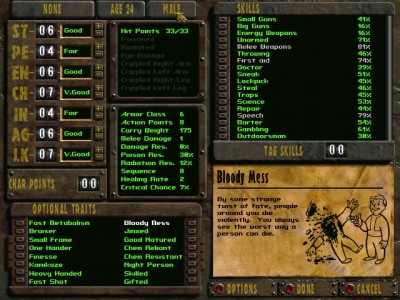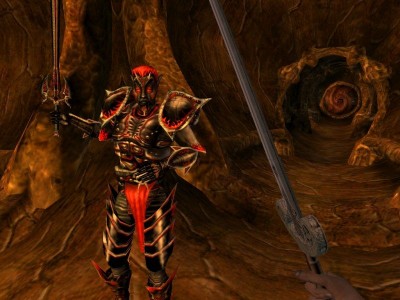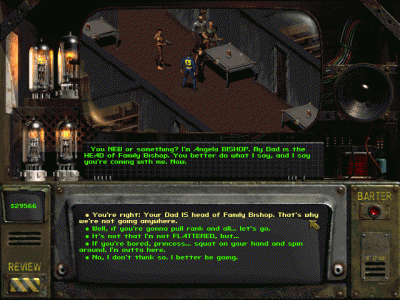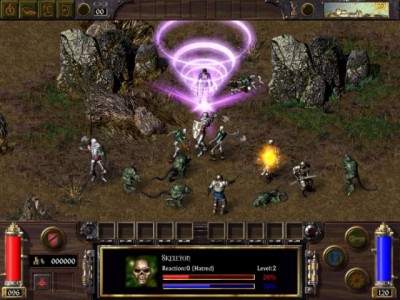Recently I have been thinking about what type of characters I make in videogames whenever the character creation option is available. It all started on some video game forum where I posted the topic “do you ever play as the opposite sex?” While thinking about this I realized that almost every time I have made a character it has been an extension of me or at least resembled what I would like to be. In WWE games, I was a big muscular wrestler with a full beard and a mullet (in retrospect I could do with out the mullet). Likewise, whenever I play RPGs, I am always the big man with the big sword. Even if that means I have to sacrifice my intelligence to obtain the strength necessary for wielding such weaponry – I will do it! Hell, once I was a retarded Orc in Arcanum, and I was almost incapable of completing a sentence. Rarely am I the all-knowing wizard or sexy female warrior. In fact, the only time I have seriously played as a female character (when given the choice) was in Fallout 2, and that “experiment” did not last long as I quickly lost interest in playing that role. So why is it that I play my RPG games with such restrictions? Why have I limited myself from the seemingly endless possibilities these games provide by simply replicating my being within the game rather than creating an entirely new and unique entity? I do not entirely know, but I could at least speculate.

Perhaps it has something to do with the fact that in emulating myself within the game, I can relate to the main character more easily and therefore immersion comes more easily. This is my typical reasoning. However, the problem I have with this is although the character may represent my person on the superficial level, they can never fully replicate my deeper characteristics. Whenever I play a RPG game, I am not the one who chooses what to say. Sure, I choose the dialogue option that represents my intentions best, but I am never truly capable of saying exactly what I want – I am limited to the voice of the writers. If I could say whatever I wanted, perhaps the outcome of the conversation would be different from whatever the developers had in mind. And so, as much as I would like to say that “I am the character” in the RPG games I play, I cannot because it is impossible for me to choose from every possible dialogue, action, reaction, etc available to me in real life. Eventually, while playing an RPG, I will stumble upon a number of dialogue choices, all of which I do not entirely agree with, and end up choosing the “best” choice rather than doing what I truly want. So, no matter how much I make this character look and act like me, I will never truly become it.
Furthermore, no matter how many options are available to the player in the end it is normally a “yes” or “no” conclusion. By that, I mean there are rarely exceptions to the dialogue choices as stated above and there are rarely exceptions to the outcome of my actions. Rarely can I kill a bunch of “good” guys and then when the time comes save the world and end up remaining a “bad guy”. Most modern RPGs would grant me a devilish red aura around my character after having killed X amount of “good” people, and then once the big game-ending decision comes have everyone praise me for doing the “right” thing in the end if had chosen to do so. There would be no shades of gray, having them praise me for what I have done, but still condemn me for my former actions by highlighting the ramifications of my past. It is either that, or since I did so many bad things in my lifetime, I do not even have the option do the “right” thing in the end. The fact is life is complicated. There are so many variables, so many potential routes, and I feel that many RPGs fail to capture the unpredictability of reality.

Still, that is to be expected. Making a game as complex as real-life would be impossible, especially with the time and budget restrictions many developers face today. However, if Bioware can make a fully voice acted MMO, then I am certain someone could focus on creating unique experiences behind most character creation options. If they did this, then playing as a woman, you may be subjected to sexism; playing as a dwarf instead of a human, you may be subjected to racism by humans. If I remember correctly, Fallout 2 accomplished this with the female role, but I have not played many RPGs after which have gone far enough with the dialogue and character responses to your appearance, sex, age, and race. Character creation needs to mean much more than just superficial looks and stats – appearance needs to affect how NPCs (non-player characters) will treat the player within the game. RPGs have done something like this in the past by having the player choose some sort of royalty (Morrowind comes to mind). So, if I am a knight in one of these games then people will treat me with respect and in turn expect me to be noble, but I think the other, more superficial elements listed before must also be considered by developers more often.
Like it or not, our world can be very superficial and something as “small” as appearance can have a huge impact on the perception of others. As someone mentioned in the topic I made about playing as the opposite sex in videogames, it seems developers shy away from things like racism and sexism to avoid controversy, but instead include sex scenes to get cheap publicity. I do not mind sex in my games, but please, do not insult my intelligence by failing to acknowledge these other complexities. RPGs may take place in fantasy worlds, but in the end, designers still found these worlds on the basic principles of reality.

When considering whether the character I make in RPG games is like me, I must also acknowledge my moral “flexibility” in gaming. Since these characters are not real, I normally do not care as much about their lives and or unfortunate situations. For example, in Fallout 2 I became a slaver so I could make some extra cash. In real life, however, I would never consider becoming such a monster. So to say that I have always played RPG games as a character that was an extension of me would be inaccurate. Interestingly, in becoming a slaver, Fallout 2 did not give me “evil points” or anything like that, but instead it allowed me to see the consequences of my actions first hand by having me condemned by an entire village immediately upon entry. Similarly, in becoming a “child killer” almost everyone will hate you without question. I feel that these explicit (and not necessarily immediately apparent) consequences are more effective than awarding the player X amount of good or bad points, as they really give you a sense of how far your seemingly irrelevant actions (non-quest related) can reach.
In realizing that I cannot become the character in RPG games, no matter how hard I try, I have begun to play RPGs with fewer restrictions. No longer do I have to be that retarded Orc I was in Arcanum, but I can be a brilliant craftsman or cunning spokesperson instead. I might even try being a woman more often if there is a substantial difference in the way characters interact with me. All these years I think I missed the point of RPGs and that is to use my imagination, so now when I am making a character I do not really care if they reflect my person, all I care about is making my experience as fun and interesting as possible.

I know RPGs can never truly capture the essence of reality, but I think it is better off that way. I am better off becoming a psychopathic slaver and relentless child-killer in Fallout 2 than trying to be my boring old self. However, I do wish that developers would not punish people by making everything so black and white. I wish that more RPG games had shades of gray, where your actions either predominately “good” or “bad” do not fully destroy the potential for deviations later on. On the other hand, I do not want RPG games to insult my intelligence by saying that in killing the big bad dragon, everything is ok, even the destruction of an entire village by my hands alone earlier on in my quest.

Jo Naylor
July 23, 2010 at 7:11 PMGreat article! Both my husband and brother will often play girls, or just random characters in the RPG’s, but I always go for a female (In fact, I laugh at then when they play girls) and oddly, though I prefer to just swing a large sword and flatten everything, winning because I am stronger and just smash them, I will almost always, without fail, pick a mage/wizard/whatever they’re calling it instead. I’ve had this same problem since I used to play Dungeons and Dragons. I always have to play the one with the magic, it always has to be a girl, and yet I then spend 88% of the time ignoring the magical abilities and hacking away at the enemy, which always puts me at a disadvantage because magical characters are always weaker. (it was so pronounced when we played the Hero Quest board game that we finally cheated and allowed me weapons I shouldn’t have had – if only video games would do that, LOL!) I haven’t exactly figured out the psychology behind those choices yet, but I agree with you that it does say something.
and yes! the lack of reaction by NPC’s is sometimes really annoying. They don;t treat a woman any different than a man – and they would. As you say, it’s one part memory space/programming and one part fear of pissing someone off, but life pisses people off, and if gamers are too sensitive to deal with it then shuffle on to another game! ;)
Great post!